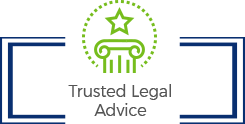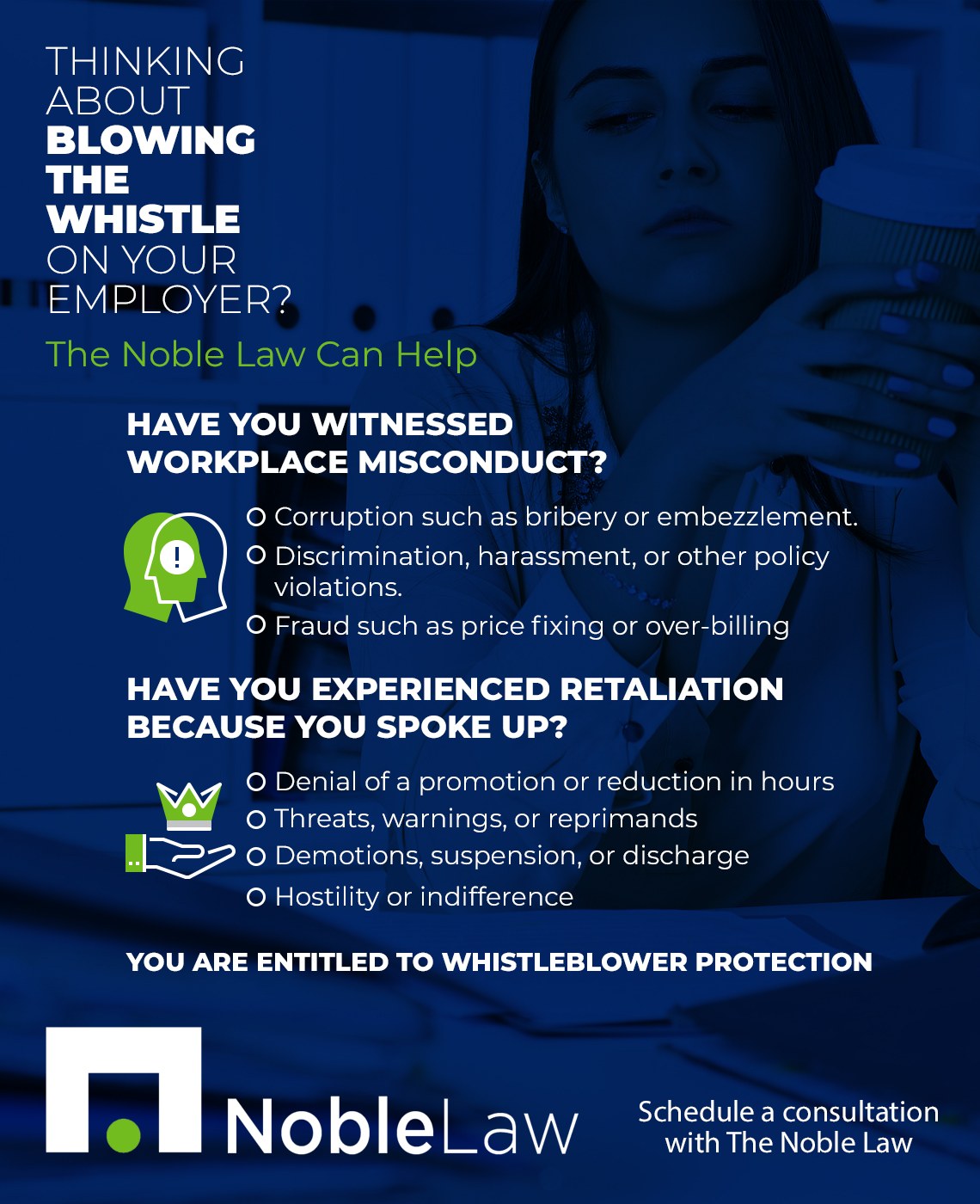Founded in 2009, The Noble Law provides consultations and legal advice to clients in South Carolina and across North Carolina on a variety of employment law issues, including workplace retaliation and whistleblower law. When you choose to partner with us, we will treat you as part of the team and provide you with top-notch, compassionate service. Open communication is key, and our employment law attorneys will support you every step of the way.
When it comes to workplace retaliation, whistleblower protection, or other issues regarding employment law, it can be hard to reach out to an employment attorney. Here at The Noble Law, we will work hard to understand your situation and help you identify your legal options, whether you choose to move forward with our firm or not. Schedule a consultation with a whistleblower lawyer in South Carolina or North Carolina today.



Retaliation for Whistleblowing
State and federal laws offer specific protections against retaliation for those who report certain illegal or fraudulent activities they see on the job. In addition, employers are required to adopt policies and procedures that encourage and protect whistleblowers.
Although whistleblowers are entitled to certain protections, employers do not always honor those rights. To complicate matters, some whistleblower laws protect all employees, while others apply only to specific industries or government entities. Some of these protections can only be exercised when the whistleblower follows strict requirements.
Speak with a skilled employment whistleblower attorney
If you have already or are considering coming forward to report fraud or another form of corruption, speak with a whistleblower rights lawyer at The Noble Law as soon as possible. If you call before you make your report, we can help you make sure you abide by the company policy and requirements of any applicable statutes. If you have already made a report, we can inform you of your rights and assist you in navigating through any retaliation you may face as a result.
Representing Victims of Workplace Retaliation
Employment law provides specific protection against retaliation. Since laws and procedures vary by location, industry, and organization or company, it is important to know what is defined as retaliation and how it may apply to your particular situation.
Retaliation can take on many forms. Your employer may retaliate against you through:
- Discharge
- Suspension
- Demotion
- Retaliatory relocation
- Hostile treatment
- Negative work reviews
- Other adverse employment action
An unlawful employment policy may even effectively constitute retaliation before any “protected activity” occurs.
To prove retaliation, you need evidence that: (1) the employee engaged in some form of protected activity, such as reporting theft, abuse, fraud or illegal activity, (2) the employer then took materially adverse action, and (3) the employer’s action was motivated by retaliation for the protected activity. Employers never admit when they are acting in retribution; instead, they tend to cite other motives like poor performance. An experienced whistleblower retaliation lawyer can help you prepare for and respond to these types of deflections so that you can put forth your strongest case possible.
You deserve a workplace that is free of illegal, toxic, and unethical behavior. If you are experiencing workplace retaliation, our employment law firm attorneys can help. The Noble Law has a long-standing reputation for no-nonsense representation, and employers take our attorneys seriously when we zealously advocate for our clients in a workplace dispute.

Understanding Whistleblower Protections
If you have performed a legally protected whistleblower activity, you are entitled to protection against workplace retaliation. That means your employer cannot fire you, take disciplinary action against you, or otherwise treat you unfairly because you “blew the whistle” and exposed illegal or unethical behavior. Examples of whistleblowing include:
- Alerting government agencies about illegal conduct in your company or agency
- Making a complaint to your superior
- Providing statements to outside auditors or investigators
- Reporting harassment, discrimination, or other violations of company policy
- Making a complaint about unfair treatment on the part of your supervisor
Sometimes, retaliation against whistleblowers can look like being singled out. For example, you are punished for small policy infractions, while others’ mistakes are overlooked. Other times, the retaliatory action may be more overt, like denial of a promotion or an outright firing. An employer may also create a hostile workplace that deters whistleblowing through the implied threat of retaliation. While this type of retaliation is more difficult to prove in a court of law, if you are feeling uncomfortable in your workplace following you filing a complaint, you may benefit from speaking with a whistleblower protection lawyer.
In many cases of retaliation, it can be difficult to clearly determine where acceptable employment actions begin and end. At The Noble Law, we will take the time to understand your situation and give you informed advice about whether you have a viable whistleblower retaliation claim. We appreciate the nuance necessary to interpret potentially hostile actions; we are here to help you recognize and prove them.
Laws Protecting Whistleblowers
Not only do many state and federal laws protect whistleblowers, but some even encourage whistleblowing by rewarding those who report illegal or unethical activities. These laws are important, but they do not always stop an employer from mistreating an employee who exposes the employer’s wrongdoing.
At the federal level, there are more than 20 whistleblower statutes, many administered by the U.S. Department of Labor’s OSHA Whistleblower Protection Program. Some of the important whistleblower laws OSHA enforces include:
- Sarbanes-Oxley Act of 2002
- Clear Air Act
- Solid Waste Disposal Act
- Anti-Money Laundering Act
- Affordable Care Act
- Federal Railroad Safety Act
- FDA Food Safety Modernization Act
- International Safe Container Act
- Seaman’s Protection Act
In addition, state laws like North Carolina’s Retaliatory Employment Discrimination Act and South Carolina’s employment anti-discrimination statute and whistleblower protection statute offer varying protections to workers who report labor law violations, make qui tam claims, or engage in other whistleblowing.
North Carolina Qui Tam Lawyer
North Carolina encourages whistleblowers to report false claims for government funds as a way to curb corruption and waste. Under both the federal False Claims Act and state laws, an employee who takes action to prevent or report to the authorities a potential fraud on the government is protected from retaliation and may even be rewarded with a percentage of the amount recovered.
Reporting an employer’s illegal activity is often an intimidating prospect, but having a skilled North Carolina qui tam lawyer by your side can help. Working with an attorney can help you head off employer retaliation and improve your chances of a successful financial recovery.
Sometimes, retaliation against whistleblowers can look like being singled out. For example, you are punished for small policy infringements, while others are overlooked. Employment law provides you recourse against such actions. There are also times when retaliation looks more subtle, for example, your employer makes your work environment uncomfortable or neglects to discipline employees who are hostile to you. An employer may also create a hostile workplace that deters whistleblowing through the implied threat of retaliation. While this type of retaliation is more difficult to prove in a court of law, if you are feeling uncomfortable in your workplace since you filed a complaint, you may benefit from speaking with an employment law attorney.
Our employment law attorneys will work to understand your situation and whether or not a case can be made for workplace retaliation due to whistleblowing. You deserve a safe, ethical, and legal workplace, and our employment law firm is here to help you restore your dignity, defend your compensation, and move towards closure. If you are in need of help with whistleblower protection in South Carolina or North Carolina, contact The Noble Law employment law firm.

Learn More
You deserve a safe, ethical, and legal workplace, and our employment law firm is here to help you protect your rights. If you have questions about whistleblower protections available to you in North Carolina or South Carolina, contact The Noble Law.
Here at The Noble Law, we listen. We hear you. We understand. Call today to discuss your rights and duties as a workplace whistleblower.
Along with representing clients with claims in the area of workplace retaliation and whistleblower protections, we also represent employees in a variety of other areas of employment law. These include Executive compensation disputes, Workplace discrimination, Pay, overtime, and leave, Workplace harassment, sexual harassment, and workplace assault, and Workplace investigations.
Learn more about our employment law firm’s Practice Areas and check out our About Page. When you choose to work with The Noble Law, you will gain a clear understanding of your legal options, whether you choose to move forward with our employment law firm or not. Our employment lawyers advise and represent clients in North Carolina and South Carolina, with offices in Charlotte, Chapel Hill, and Mt. Pleasant. If you’re interested in speaking with one of our employment attorneys, contact us today.






